(updated below)
One of the very few arguments one can make which will prompt virtually identical objections from both standard right-wing neoconservative fanatics as well as a small, unrepresentative cluster on the Left concerns the question of America's moral credibility in the world and the esteem in which our country is held.
If one argues -- as I frequently do, including as a central argument in A Tragic Legacy -- that America's hard-earned moral credibility in the world has collapsed as a result of the Bush presidency, one can hear similar objections from each side -- namely, that while America is despised in much of the world, that has little or nothing to do with events over the last six years.
Instead, this line of reasoning goes, America was disliked well prior to the advent of Bush radicalism, either because (in the view of neoconservatives as illustrated by Hugh Hewitt here), those who dislike America are intrinsically hateful of America and our values no matter what we do. Or (in the view of a small group on the Left), America is hated not because of what we have done in the last six years, but because America has been a bullying force of Evil in the world for the last several decades (at least) and our behavior under Bush is nothing new for America; it is but a natural extension of the country's foundational or long-embraced values (a portion of that argument, though not its entirety, was made by Chris Floyd here).
The new comprehensive worldwide Pew poll of public opinion conclusively disproves both of those views. The polling data demonstrates that while America's standing in the world is dangerously low on every continent in the world (the sole exception being Christian nations in Africa), pervasive anti-American sentiment has emerged only in the last six years. Prior to the Bush administration, America was respected and admired in most of the world, its values a source of inspiration, the ideals it espoused a source of widespread respect. Those are just facts.
The collapse of America's moral standing in the world -- the intense and widespread contempt in which we are held -- is, without question, a direct by-product of our behavior over the last six years. While America, like every country, has made mistakes and engaged in wrongful behavior prior to that, it was viewed by an overwhelming majority of people in the world as a net force for good. Far from the claim by neoconservatives and their allies that the "international community" is intrinsically anti-American no matter what we do -- and we should therefore ignore it and express our contempt for it -- the widespread respect America commanded and the admiration for our values was, prior to George W. Bush, a vital ingredient of our national security and ability to protect our interests.
Initially, simply compare the percentages of people around the world, on every continent, who held favorable views of the United States in 1999-2000, versus the staggeringly small percentages who hold such views a mere seven years later: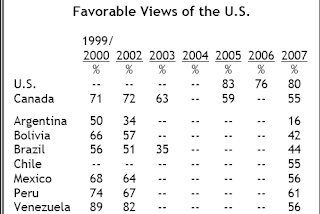


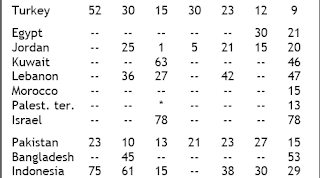 The picture that emerges here is conclusively clear. In virtually every area of the world -- Western Europe, Eastern Europe, Latin America and Asia -- overwhelming majorities of people viewed the U.S. favorably prior to the Bush presidency. But in virtually every single country in each of those regions, the percentage which now views the U.S. favorably has collapsed, and is now confined only to minorities, often tiny minorities.
The picture that emerges here is conclusively clear. In virtually every area of the world -- Western Europe, Eastern Europe, Latin America and Asia -- overwhelming majorities of people viewed the U.S. favorably prior to the Bush presidency. But in virtually every single country in each of those regions, the percentage which now views the U.S. favorably has collapsed, and is now confined only to minorities, often tiny minorities.
The precipitous drop in U.S. credibility -- from levels of great respect to levels of widespread contempt -- is as stark among America's traditional allies as it is in less friendly regions. Contrary to claims found among both America's right and some on Europe's left, the U.S. enjoyed great moral credibility among its Western European allies prior to the Bush presidency:
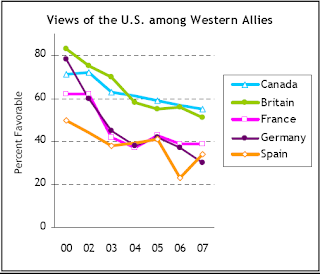 Even with regard to the Muslim world, where data is sketchy, the esteem in which America is held is staggeringly low -- but that, too, is a recent development. America's favorability rating in Turkey, for instance, was a robust 52% in 2000, and has now collapsed completely to a startling 9%. The trend is the same in Indonesia (75% to 29%) and similar even in natural U.S. allies such as Kuwait (63% to 46%).
Even with regard to the Muslim world, where data is sketchy, the esteem in which America is held is staggeringly low -- but that, too, is a recent development. America's favorability rating in Turkey, for instance, was a robust 52% in 2000, and has now collapsed completely to a startling 9%. The trend is the same in Indonesia (75% to 29%) and similar even in natural U.S. allies such as Kuwait (63% to 46%).
It is only in Africa where U.S. popularity remains high, but even there, perceptions of America depend upon one's religious affiliation, with African Chrisitans (on whose side we are perceived to be) viewing the U.S. favorably while Africa's Muslims (who perceive us as hostile to them) have the opposite view:
 (A similar trend is apparent in Lebanon, where almost all favorability perceptions are found among Lebanese Christians, while Lebanese Shiites are almost uniformly hostile, with Sunnis split).
(A similar trend is apparent in Lebanon, where almost all favorability perceptions are found among Lebanese Christians, while Lebanese Shiites are almost uniformly hostile, with Sunnis split).
More significantly still, huge majorities in Europe and Latin America were prepared to support the U.S. in its war on terrorism -- not merely in the immediate aftermath of 9/11 but also for a year or two thereafter -- but inexorably changed their minds as they saw the extremism, brutality, unlimited aggression, and complete abandonment of American ideas which drove that "war":
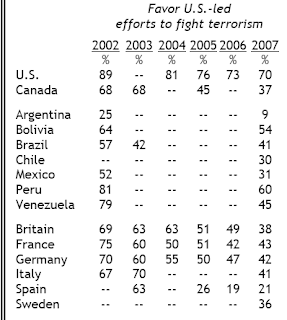 And in what is perhaps the most tragic aspect of the Bush legacy, large numbers of people around the world, over the last six years, have abandoned their belief in U.S. democratic values -- the exact opposite result, literally, of our ostensible objective in everything we have done in the last six years:
And in what is perhaps the most tragic aspect of the Bush legacy, large numbers of people around the world, over the last six years, have abandoned their belief in U.S. democratic values -- the exact opposite result, literally, of our ostensible objective in everything we have done in the last six years: Finally, it is worth noting one fact that is indisputable yet frequently denied in American political discourse, except when it is ignored altogether -- namely, that America's blind support for Israel in its disputes with its neighbors plays a key role -- not the only role, but a key role -- in why America's moral standing has collapsed:
Finally, it is worth noting one fact that is indisputable yet frequently denied in American political discourse, except when it is ignored altogether -- namely, that America's blind support for Israel in its disputes with its neighbors plays a key role -- not the only role, but a key role -- in why America's moral standing has collapsed: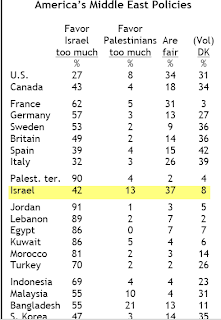 Note that even a plurality of Israelis believe that our Middle East policies have excessively favored Israel.
Note that even a plurality of Israelis believe that our Middle East policies have excessively favored Israel.
If it were true that the U.S. has been a force for Evil in the world for decades, as some believe; or if it were true that people around the world inherently hate the U.S. due to some combination of anti-freedom hostility or jealousy or some other similar ignoble motives, then it really would not matter what we have done over the last six years in terms of our moral standing. But all of those premises are plainly false.
The role that the U.S. has played in the world for decades is critically important. The ideals and political principles which this country for decades has symbolized have been -- even when we have deviated from those principles -- a critical anchor for our security and standing in the world as well as a vital source of inspiration for people on every continent. As the world's sole superpower, the face that we choose to show to the world, the principles which guide our actions, are incomparably important.
When we adhere to those values and exemplify those principles, people around the world see that and judge our country accordingly. When we repudiate those values and violate those principles, our moral standing and credibility collapse. There is a direct causal link between how we conduct ourselves and how we are perceived in the world.
Our standing in the world has changed profoundly over the last six years -- it has collapsed almost completely -- for only one reason: because we have fundamentally changed how we conduct ourselves, the principles that guide us, the values we embody. The world was not "anti-American" before the Bush presidency, but -- at least in terms of how the world perceives our country -- it is now. That is one of the key aspects of the Bush legacy that is "tragic."
Plainly, America's standing in the world can be changed again, the collapse reversed, our credibility restored. But that can happen only if we repudiate the radicalism and brutality and complete disregard for civilized norms that have defined us at our core since the 9/11 attacks. This comprehensive Pew poll provides the definitive refutation for those who claim that the U.S. has been hated for decades, as well as for those who claim that the U.S. will be hated no matter what it does.
UPDATE: In comments, Che Pasa, echoing the objections of several other commenters, argues that this post conflates two logically distinct issues -- how America is perceived in the world versus what America, in fact, is. Thus, he argues, simply because America was liked and respected around the world prior to the Bush administration does not negate the claim that America has been a net force for Evil, since public opinion may simply have been wrong (by having a higher opinion of America than was actually warranted).
Strictly speaking, he's right. It is theoretically possible that America was popular in the world prior to 2001 not because it was a force for Good, but because world opinion was simply wrong. Of course, the converse -- as Bush supporters would be quick to point out, justifiably -- is equally true: the fact that America is unpopular now does not prove that what America is doing is wrong, since world opinion may simply be misguided.
Either way, what is indisputably true is that world opinion regarding America has profoundly shifted -- for the worse -- since 2000. The question, then, is why has that happened? My answer is the simplest and most obvious one (which does not mean it is right): namely, public opinion of America has fundamentally changed over the last six years because our behavior in the world, our national character and our defining values have fundamentally changed.
But for those who want to argue that America under Bush is pretty much the same as it has always been -- just a slightly modified version of its decades-long bullying, imperialistic, pillaging self -- it is incumbent to explain what accounts for this grave collapse in world opinion over the last six years. If it is true that America under Bush is doing roughly the same as it has done over the last 30-40 years, then one would expect public opinion regarding America to be constant as well. But it isn't. Public opinion has changed profoundly. If America's behavior hasn't changed profoundly, then what explains that shift?
On a different note, a reader, DE, e-mailed to point out that the polling data I cited regarding Israel supports the notion that large majorities believe that American policy is excessively pro-Israel, but does not support (because it has nothing to do with) my claim that this belief is a "key reason" for anti-Americanism around the world. The reader's point is correct. I do believe that, certainly in the Middle East, America's virtually blind support for Israel under Bush is a key factor in anti-American hostility, but the polling data I cited does not support that claim.
UPDATE II: Further discussion of these issues, including responses from other bloggers and a clarification on the post by Chris Floyd, is here.



Shares